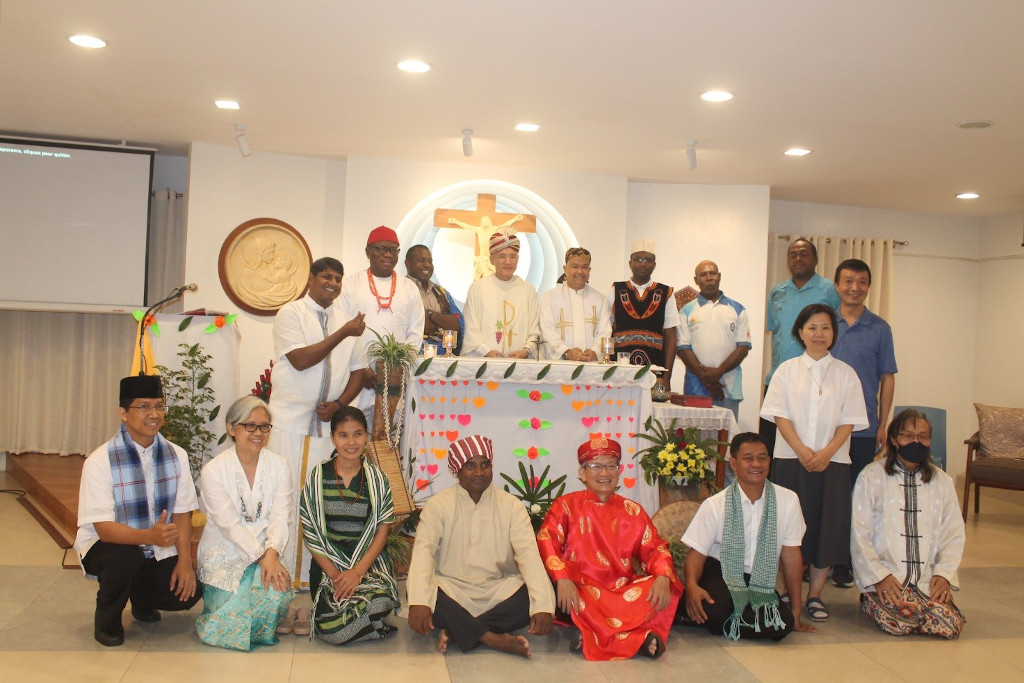Our November cultural Mass had for its theme the “Signs of the Times”. In his homily, the main celebrant, Fr Hartono Budi SJ, told us the legend of Malin Kundang, a young boy who, very early in his life, was separated from his village, and upon returning as an adult refused to recognize his mother because, according to his standards, she was poor (while he was rich, educated, and sophisticated with a beautiful wife). He could neither relate nor associate with his humble beginnings. In order to remind him of his roots and his connection to his family, his mother cooked him his favorite meal, but he remained closed and refused to acknowledge what his senses perceived.
This Indonesian legend of Malin Kundang related by the elders to the young ones has mystical depth and connects well with our theme. The “Signs of the Times” was chosen by the 14 participants of the Sabbatical Program based on the Gospel reading of the day (Lk 17:26-37). Like Malin Kundang, the Pharisees often doubt whether Jesus really is the Messiah, the long-awaited King, and ask him for signs and proof. But Jesus also knew that even among his disciples, some were like Malin Kundang, whose encounter with the Son of God did not lead them to primary faith.
It is not always easy to grasp the signs of God’s presence when we are left to ourselves. Like Malin Kundang, we run the risk of basing our knowledge only on personal perceptions. This was stressed in the modules given in the first two weeks of November, particularly on the “Second Vatican Council”, then on “Synodality as Leadership Today”, and finally, on “Digital Mysticism and Prophecy”.

The Second Vatican Council (1962-1965) where we have the first occurrence of the expression “Signs of the Times” encourages us to use the “language intelligible to each generation, […to] respond to the perennial questions which men ask about this present life and the life to come, and about the relationship of the one to the other” (Gaudium et Spes 4). And here I would like to add, synodally.
Looking at the signs of the times, in this age characterized by interactive two-way evangelism, we are called to leave the long-standing practice of one-way broadcast evangelism with its passive receivers of faith, to become or train to become active interpreters and faith sharers. If we want to be one step ahead of the world, we must, as the legend of Malin Kundang teaches us, be open to relearning how to listen, to relearning how to learn again, and “instead of behaving like gatekeepers trying to exclude others from the table, we need to do more to make sure that people know that everyone can find a place and a home here” (Remark by a parish group from the USA, see Secretaria Generalis Synodi, Enlarge the space of your tent [Is 54:2], Working Document for the Continental Stage, Rome 2022).
Our cultural Mass was the right place to ask God’s forgiveness for what is still not right and to pray for what needs to be improved. As we gathered together, brothers and sisters from across nations, we were reminded of how all the cultures of the world, all the People of God, all religions, and all people of good will are invited to “journey together”. In the awareness of being interconnected as brothers and sisters, we can “travel together” to decipher the signs of God’s presence in the midst of hatred, jealousy, war, and death, in the midst of prophecies, miracles, and unusual events. At the same time, we recognize our diversity and thank the Lord for the good things happening in a world that has become so interconnected, so multicultural, and so international.
Fr. Kuafa Lontsi Herve, CICM is a participant from Cameroon.

